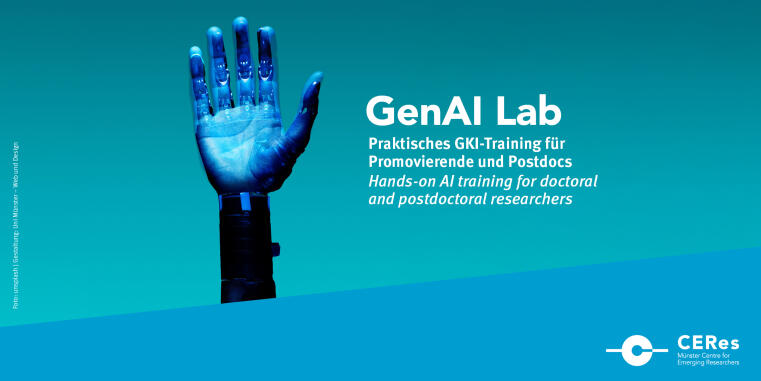
Zielgruppe: Promovierende und Postdocs
GenAI Lab ist eine praxisorientierte Workshopreihe für Promovierende und Postdocs, die das Potenzial generativer KI (GKI) in ihren akademischen Tätigkeiten erkunden möchten. Jeder Workshop widmet sich einem spezifischen Bereich und beinhaltet praktische Beispiele oder Fallstudien, die fachübergreifend anwendbar sind. Die Teilnehmenden nehmen an interaktiven Aktivitäten, Übungen (einschließlich der Prompting-Techniken) und reflektierenden Diskussionen teil.
Dieses Training eignet sich für:
- Neugierige Forschende mit wenig bis gar keine Vorkenntnisse oder Anwendungserfahrungen, die ihre Forschungsaktivitäten mithilfe von GKI-Tools effizienter, wirkungsvoller und innovativer gestalten möchten.
- Forschende mit grundlegenden Kenntnissen und Anwendungserfahrungen, die an weiterführenden Informationen über spezifische GKI-Tools interessiert sind und ihre Anwendung verbessern möchten, ohne sich zu sehr mit technischen Details auseinanderzusetzen.
Bitte lesen Sie die einzelnen Workshopbeschreibungen, um zu prüfen, ob die jeweilige Session zu Ihrem aktuellen Erfahrungsstand im Umgang mit generativer KI passt.
Voraussetzungen: Teilnehmen können die Personen, die einen Platz erhalten haben, zur Zielgruppe gehören und die Vorbereitungsumfrage ausgefüllt haben. Die Umfrage erfasst Vorerfahrungen im Umgang mit generativen KI-Tools sowie Erwartungen, damit die Workshopleitungen Inhalte und Beispiele bestmöglich auf die Bedürfnisse der Teilnehmenden abstimmen können.
Die Sprache des Workshop-Titels gibt an, in welcher Sprache der Workshop durchgeführt wird. // The language of the workshop title indicates the language in which the workshop will be delivered.
